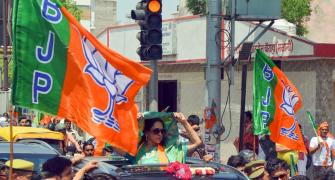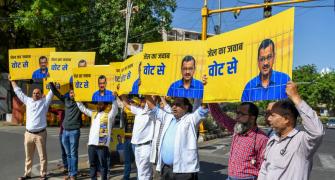
India and Pakistan may be moving towards peace but clearly, separatist leader Syed Ali Shah Geelani is not impressed.
He believes that when it comes to Kashmir, India will balk and the talks will derail.
The 75-year-old also claims that the new party he announced earlier this week -- the Tehreek Hurriyat Jammu and Kashmir -- will 'insulate the present freedom struggle in Jammu and Kashmir from being stabbed in the back'.
Correspondent Mukhtar Ahmad spoke to him at his residence in Hyderpora, Kashmir. Excerpts:
You floated your own party recently. What prompted you to do this?
The Tehreek Hurriyat Jammu and Kashmir was formed to insulate the present freedom struggle in Jammu and Kashmir from being stabbed in the back, as has repeatedly happ
| |||||||||||
The people of Jammu and Kashmir launched their struggle against the Dogra autocracy in 1931 under the banner of the Muslim Conference, which symbolised the Muslim majority character of the state and the political aspirations of its people.
In 1938, the Muslim Conference was converted into the National Conference and this was the first act of sabotage against the political aspirations of the people of the state.
The NC leaders rejected Muslim Pakistan and joined hands with the Indian secular leadership.
The six-year period between 1947 and 1953 witnessed the oppression of the people, who demanded merger of the state with Pakistan. Realising the people's mood, the NC leadership started demanding fulfilment of promises made by the Indian leadership to the people of the state.
The demand led to incarceration of Sheikh Abdullah for eleven years.
Also see: 'They are killing democracy in Kashmir'
The party, however, continued its struggle for 22 years, after which it again opted for power in 1975, joining hands with those whom they would call 'worms of the gutter'.
The saga of betrayal of the people of the state continued unabated even after 1989, with many forces taking on secular hues in preference over Islamist credentials in pushing forth the freedom struggle of the people.
The posturing was strategic to garner patronage from Western powers.
The THJK is an upshot of these betrayals and lays its agenda in highly unambiguous terms, and the agenda is that the state, being a Muslim majority state, shall achieve its objective by pursuing the tenets of Islam, which say that a Muslim has to choose a Muslim as a friend and not a non-Muslim.
Aren't you sailing in three boats -- the Jamaat-e-Islami, All Parties Hurriyat Conference and now your own party.
There is no conflict among the three entities. I have been a member [rakun] of Jamaat-e-Islami right from 1953 and the THJK will pursue the same Islamic ideology that constitutes the bedrock of the JeI.
Also see: 'Ceasefire is only for propaganda'
Apart from what is stated in reply to your first question, I had to constitute the THJK to have a party to justify my position as chairman of the All Parties Hurriyat Conference.
As you know, APHC is a conglomerate of separatist groups and the Jamaat-e-Islami had retired me from the party.
My presidency of the THJK is an interim arrangement and once the body is constituted it will elect a head, whosoever it may be.
Doesn't it reflect a tri-dimensional personality in you?
These are not three parties. The APHC is a forum. My affinity with JeI's ideology is everlasting and my presidency of THJK is an interim arrangement.
If the members would like to change this arrangement they can do so.
Don't you feel the mushrooming of political parties has weakened the separatist voice in Kashmir and confused the people?
Mushroom growth of parties is everywhere. See across India, how many parties are there. It is for the people to make a distinction taking into account the parties' past and their objectives.
Also see: India has put us in an awkward position: Ansari
It is for the people to look for a diamond in a heap of charcoal.
Do you consider quitting JeI and APHC in near future to focus only on your organisation?
When we talk of freedom struggle we talk of Islam. In this struggle we have to be guided solely by the tenets of Islam, in which context the THJK is only reinforcing the Islamic ideology propounding JeI. Islam does not allow slavery. It is a religion that prompts struggle against slavery.
As far as your agenda on Kashmir is concerned, you are seen as a hardline separatist leader. Isn't there any other solution to the Kashmir problem other than what you propound, which is the right to self-determination?
I enjoy my image as a hardliner. For, it is only the people who stick to their principles and do not demonstrate flexibility in their stand who attract this description.
I feel my stand is principled and realistic. The people who fall in the other category are called moderates.
You have always been suspicious of New Delhi's intentions towards Kashmir, and this you claim to be the chief reason for your opposition to a dialogue between the Centre and separatist leaders.
Our Indian experience is as old as 57 years. Even after this long experience if we do not fully understand the Indian approach to Kashmir problem and its intentions, then we are fools.
When the APHC started the dialogue process with New Delhi, I made it clear to them that it was a futile exercise, which has now been proved.
I would also make this prophecy that when the ongoing India-Pakistan dialogue reaches the stage of addressing Kashmir, India will show its thumb to Pakistan.
My perception is that the farthest India will go on the Kashmir issue is a solution around the Line of Control.
Against this background, we need an organisation that will not let despair step in but keep the struggle going till it reaches its logical conclusion, for which people have made great sacrifices.
But now Islamabad seems to trust New Delhi. Has this changed your approach?
Pakistan is not trusting India. Pakistan's behaviour is that of complacency. They tend to hope that India perhaps may settle the Kashmir issue against the backdrop of its history and the aspirations of the people.
This hope of Pakistan, let me tell you, shall soon turn into a mirage.
Are your doors still closed on the other APHC groups?
If you entrust your precious property to someone, and he harms this property or does not safeguard it properly, would you again entrust your property to the same person?
Now that the home minister [Shivraj Patil] has said dialogue can only be held within the Constitution of India, do you as a senior politician believe this to be the end of the road for the Abbas Ansari-led APHC?
[Laughs] We cannot trust any Indian commitment until and unless India recognises the disputed nature of Jammu and Kashmir in unambiguous terms, withdraws its forces to the barracks, repeals the Disturbed Areas Act, releases all detenues unconditionally, revokes the 1994 Parliament resolution declaring Jammu and Kashmir as an integral part of India, ends repressions and allows peaceful struggle.
Please put the question relating to continuation of dialogue within the Constitution to the people who started the dialogue in January this year.
I had at that point of time said it is futile.
Is there any possibility of your participation in the dialogue process with the Government of India in the near future?
[Laughs again] It will be a wastage of time.
Image: Rahil Shaikh








